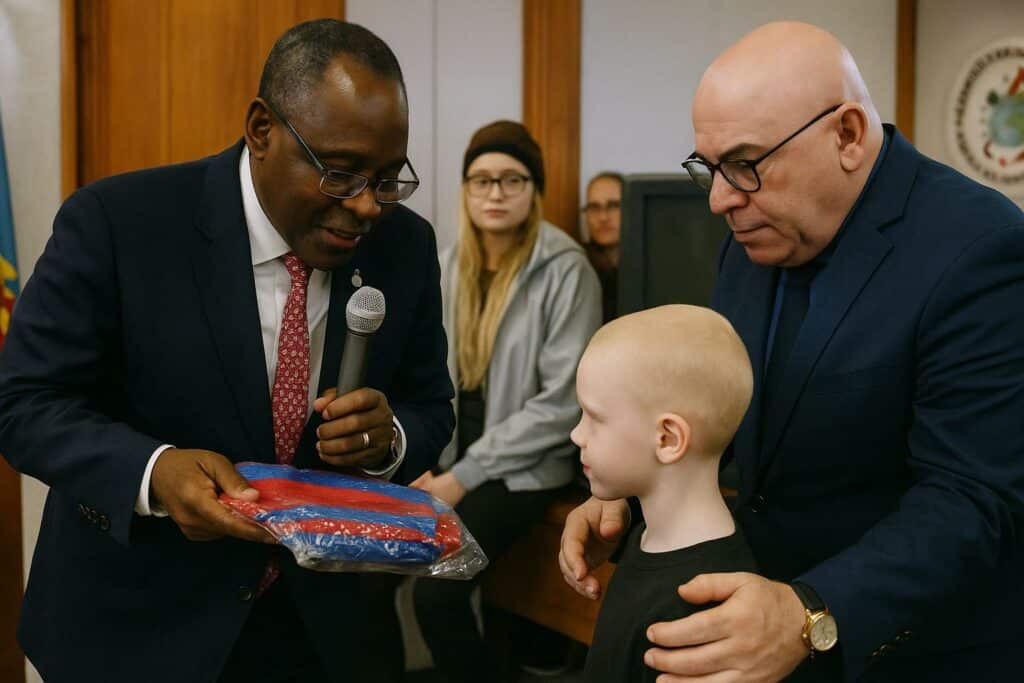Civic Generosity Illuminates Brazzaville Classrooms
A hum of eager voices filled a modest school courtyard in Brazzaville on 11 October as the Association Jhony-Chancel pour les Albinos (AJCA) joined forces with the organisation Redonner le sourire. Together they handed over notebooks, pens and carefully selected bottles of high-protection sunscreen to dozens of pupils living with albinism. The scene, discreet yet emblematic, demonstrates a form of civic generosity that is quietly reshaping the social landscape of the Republic of Congo.
Invited guests included representatives of partner institutions, testimony to a solidarity that extends well beyond the two NGOs. Addressing the gathering, AJCA spokesperson Sylvia Okandzé placed the gesture in its wider context: education, she stressed, remains ‘one of the decisive keys to personal and collective development’. By equipping children with the basic tools of learning, the association wishes to give them ‘the chance to dream, to hope and to build a better future’.
Education as the Gateway to Inclusion
The decision to focus on school supplies is not accidental. For children with albinism, already a demographic minority, the classroom can be both a refuge and a stage on which they must constantly demonstrate resilience. Okandzé recalled that fostering assiduity at school prepares the ‘responsible citizens of tomorrow, capable of contributing actively to national progress’. In her view, the kits symbolise a contract of confidence linking families, teachers and civil society: if children remain in school, society commits to stand by them.
Echoing that sentiment, Jhony Chancel Ngamouana, founder of AJCA and current president of the Central African Network of Organisations of Persons with Albinism, urged parents to ‘send their children to class with peace of mind’. He reiterated that every distribution undertaken by his team pairs stationery with sunscreen so that youngsters can ‘walk to school in tranquillity, shielded from the sun’s rays’.
Health Protection Beyond the Classroom Walls
While notebooks bolster learning, sunscreen preserves health. Because deficient melanin renders albino skin particularly vulnerable, dermatological care is non-negotiable. ‘A well-protected skin is a better-preserved life,’ Okandzé insisted, linking health protection to the right to education. In providing industrial-grade creams, the NGOs reduce the risk of lesions that often force pupils to abandon the school year.
The donation thus transcends symbolism: it responds to an identified medical need. Since 2017 AJCA has operated a specialised clinic in Brazzaville that offers free consultations, adapted treatments and, if necessary, medical evacuations abroad. Physicians from Mali, Uganda, Belgium and Russia have periodically reinforced local teams, illustrating a pragmatic form of South-South and North-South cooperation.
A Decade of Structured Commitment
Founded in 2014, AJCA has steadily expanded its field of action from cultural awareness to integrated social support. The creation of a health facility four years after its birth marked a turning point, anchoring the association in tangible service delivery rather than advocacy alone. The latest distribution therefore forms part of a continuum of initiatives that now include schooling assistance, dermatological follow-up and psychosocial counselling.
Ngamouana’s approach privileges partnership. On 11 October he publicly thanked Minister-Delegate Jean Luc Okio, charged with State Reform, for attending the ceremony and for what he called the government’s ‘benevolent attention’. He also expressed gratitude to the Embassy of the Russian Federation, whose ‘constant support’ has helped maintain the free clinic and the educational outreach programme.
Public Authorities and Foreign Partners: A Delicate Synergy
The Brazzaville event offered a snapshot of a delicate yet promising synergy between civil society, the Congolese administration and external allies. Minister-Delegate Okio’s presence signalled official endorsement without compromising the independence of the NGOs, while the Russian embassy’s backing illustrated how bilateral cooperation can translate into micro-level benefits.
Such alignment matters. By pooling efforts, the actors involved ensure that the right to education—enshrined in Congolese law and echoed in regional commitments—is not thwarted by preventable health complications. The model forged by AJCA and its partners could inspire similar actions in other regions of the country, where children with albinism still face logistical, medical and often cultural obstacles.
À retenir
The distribution of school kits and sun-care products confirms a holistic vision in which learning and health are mutually reinforcing. The initiative consolidates nearly ten years of AJCA engagement and benefits from the explicit support of government and foreign partners, positioning Brazzaville as a laboratory for inclusive social policy.
Le point juridique/éco
From a regulatory perspective, the gesture aligns with Congo’s commitment to the Convention on the Rights of the Child, which obliges States to guarantee both education and health. Economically, the prevention strategy could reduce future public health expenditures linked to skin cancer or visual impairment, illustrating the fiscal prudence of early social investment.

